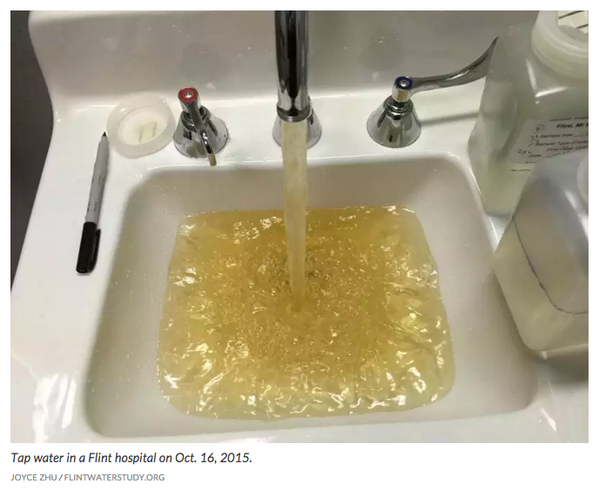Story highlights
- Community advocates assert that Flint residents are victims of "environmental racism"
- Flint was neglected because it is 57% black and 41.5% poor, advocates say
- "Absolutely not," Republican Gov. Rick Snyder says to accusations
(CNN)The
contamination of drinking water in Flint, Michigan, has so outraged
community advocates that they now pose a powerful question: Was the city
neglected because it is mostly black and about 40% poor?
Several
advocates say yes. They charge that Flint residents are victims of
"environmental racism" -- that is, race and poverty factored into how
Flint wasn't adequately protected and how its water became contaminated
with lead, making the tap water undrinkable.
"Would
more have been done, and at a much faster pace, if nearly 40 percent of
Flint residents were not living below the poverty line? The answer is
unequivocally yes," the NAACP said in a statement.
Others go further.
"While
it might not be intentional, there's this implicit bias against older
cities -- particularly older cities with poverty (and) majority-minority
communities," said Democratic U.S. Rep. Dan Kildee, who represents the
Flint area.
"It's hard for me to
imagine the indifference that we've seen exhibited if this had happened
in a much more affluent community," he said.
For
the record, Flint is 57% black, 37% white, 4% Latino and 4% mixed race;
more than 41% of its resident live below the poverty level, the U.S. Census says.
NAACP
President and CEO Cornell Brooks drew a direct equation between Flint's
socioeconomic factors and the toxic drinking water.
"Environmental Racism + Indifference = Lead in the Water & Blood," he tweeted.
Governor points the finger at bureaucrats
State officials, however, vehemently dispute the claim.
"Absolutely not," Republican Gov. Rick Snyder told MSNBC. "Flint
is a place I've been devoted to helping. ... Several cities -- Detroit,
Flint, Pontiac, Saginaw -- I've made a focused effort since before I
started in office to say we need to work hard to help people that have
the greatest need."
For sure, "there were major failures here," Snyder added.
But
he blamed the crisis on incompetent bureaucrats, specifically citing "a
handful of quote-unquote experts that were career civil servant people
that made terrible decisions," he said.
Already,
Susan Hedman, the U.S. Environmental Protection Agency's regional
administrator for Flint, Michigan, has resigned in the wake of the
crisis.
Brooks met with the governor Tuesday.
"His
tone was one of remorse and regret and I took that to be genuine," he
said. "I think the residents and citizens of Flint will take the
remorse of government to be genuine when they see safe, pure, quality
water coming out of the tap."

Brooks is pressing for a definitive plan of attack.
"We're
trying to take action that is specific, that's focused, that's urgent
and speaks to the people's needs," he said. "Talking with a deadline
that has dollar symbols represents action, and that's what we're trying
to do."
Michael Moore: Arrest governor
The matter has been discussed in social media, particularly by filmmaker and Flint native Michael Moore.
Moore
said the governor should be arrested for his role in the Flint water
crisis. A state plan to save $15 million on Flint's water bills may now
cost $1.5 billion in clean-up, Moore said in his online petition for help from President Barack Obama.
"This
is a racial killing. Flint MI is 60% black. When u knowingly poison a
black city, u r committing a version of genocide #ArrestGovSnyder,"
Moore tweeted at one point.
"Just to be clear: all 102K
residents of Flint have been exposed to toxic water, all of Flint's kids
have ingested lead, & 10 ppl have died," Moore tweeted on another
occasion.
The Black Lives Matter group
said African-Americans, especially those in rural and poor area, have
long been denied equal access to clean drinking water.
"The
crisis in Flint is not an isolated incident. State violence in the form
of contaminated water or no access to water at all is pervasive in
Black communities," the group said on its website.
On
Monday, state Attorney General Bill Schuette said he is appointing an
ex-prosecutor and Detroit's former FBI chief to join the investigation
into Flint's water crisis, creating a "conflict wall" between the
state's inquiry and the lawsuits targeting the state.
The
prior announced investigation will determine "whether any Michigan laws
were violated in the process that created a major public health crisis
for Flint residents."
"I would
certainly not bathe a newborn child or a young infant in this bad water,
and if you can't drink the bad water, you shouldn't pay for it," Schuette said.
Flint's
state of emergency -- declared at municipal and state levels -- began
years ago when the city suffered a financial emergency. The state took
over the city's budget and decided to temporarily switch Flint's water
source from Lake Huron to the Flint River as a cost-saving measure until
a new supply line to Lake Huron was ready.
The river, however, was long-known as befouled. Locals call it the "General Motors' sewer."
After
the April 2014 switch, residents complained their water had problems.
Virginia Tech researchers found the water was highly corrosive. A
class-action lawsuit alleges the state Department of Environmental
Quality didn't treat the water for corrosion, in accordance with federal
law, and because so many service lines to Flint are made of lead, the
noxious element leached into the water of the city's homes.
The
city switched back to the Lake Huron water supply in October, but the
damage was already done to the lead pipes. The state is now handing out
filters and bottled water with the National Guard.
CNN
YEMI





0 comments:
Post a Comment